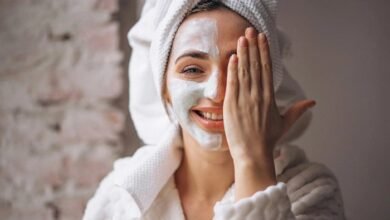DIY Hair Masks for Healthier, Shinier Hair
Discover natural DIY hair masks for healthier, shinier hair. Easy recipes for all hair types to restore shine and vitality at home.

Achieving healthier, shinier hair doesn’t always require expensive salon treatments or chemical-laden products. DIY hair masks, made from natural ingredients, can be a game-changer for your hair care routine. These masks are not only cost-effective but also free from harmful additives, making them a safe and nourishing option for all hair types. Whether you’re dealing with dryness, frizz, or lackluster locks, DIY hair masks can help restore your hair’s natural vitality and shine. In this article, we’ll explore the benefits of DIY hair masks, provide recipes for various hair concerns, and share tips on how to use them effectively.
Hair is often considered a reflection of overall health, and maintaining its shine and strength requires consistent care. Environmental factors, heat styling, and chemical treatments can take a toll on your hair, leaving it dull and damaged. DIY hair masks offer a natural solution to these problems, providing deep conditioning, repairing split ends, and promoting hair growth. By incorporating these masks into your routine, you can achieve salon-quality results from the comfort of your home. Let’s dive into the world of DIY hair masks and discover how they can transform your hair.
The Benefits of DIY Hair Masks
DIY hair masks are packed with nutrients that nourish your scalp and hair follicles. Ingredients like honey, avocado, coconut oil, and eggs are rich in vitamins, minerals, and fatty acids that strengthen hair strands, prevent breakage, and add a natural shine. Unlike commercial products, DIY masks allow you to customize the ingredients based on your specific hair needs. For instance, if you have oily hair, you can use ingredients like lemon juice or aloe vera to balance oil production. On the other hand, dry hair can benefit from deeply hydrating ingredients like olive oil or yogurt.
Another advantage of DIY hair masks is that they are free from synthetic chemicals, parabens, and sulfates, which can strip your hair of its natural oils and cause long-term damage. By using natural ingredients, you can ensure that your hair receives gentle yet effective care. Additionally, making your own hair masks is an eco-friendly option, as it reduces the need for plastic packaging and minimizes your carbon footprint.
DIY Hair Mask Recipes for Different Hair Types
For Dry and Damaged Hair
Dry and damaged hair requires intense hydration and repair. A mask made with avocado, honey, and coconut oil can work wonders. Avocado is rich in healthy fats and vitamins E and B, which moisturize and strengthen hair. Honey acts as a natural humectant, locking in moisture, while coconut oil penetrates the hair shaft to prevent protein loss.
Recipe: Mash one ripe avocado and mix it with two tablespoons of honey and one tablespoon of coconut oil. Apply the mixture to damp hair, focusing on the ends. Leave it on for 30 minutes before rinsing with lukewarm water.
For Oily Hair
Oily hair can benefit from a clarifying mask that removes excess oil and impurities. A combination of aloe vera, lemon juice, and bentonite clay can help balance oil production and cleanse the scalp.
Recipe: Mix two tablespoons of aloe vera gel, one tablespoon of lemon juice, and one tablespoon of bentonite clay. Apply the mask to your scalp and hair, leaving it on for 20 minutes before rinsing thoroughly.
For Frizzy Hair
Frizzy hair needs smoothing and taming. A mask made with banana, yogurt, and almond oil can help control frizz and add shine. Banana is rich in potassium and natural oils, which soften hair, while yogurt provides protein to strengthen strands.
Recipe: Blend one ripe banana with two tablespoons of yogurt and one tablespoon of almond oil. Apply the mask to your hair, covering it with a shower cap. Leave it on for 45 minutes before washing it out.
For Hair Growth
If you’re looking to promote hair growth, a mask with eggs, castor oil, and fenugreek seeds can stimulate the scalp and strengthen hair follicles. Eggs are packed with protein, which is essential for hair growth, while castor oil improves blood circulation to the scalp.
Recipe: Beat one egg and mix it with one tablespoon of castor oil and one tablespoon of fenugreek powder. Apply the mask to your scalp and hair, leaving it on for 30 minutes before rinsing with cool water.
For Dull Hair
To restore shine to dull hair, a mask with apple cider vinegar, olive oil, and egg yolk can work wonders. Apple cider vinegar balances the scalp’s pH, while olive oil and egg yolk provide deep conditioning.
Recipe: Mix two tablespoons of apple cider vinegar, one tablespoon of olive oil, and one egg yolk. Apply the mask to your hair, leaving it on for 20 minutes before rinsing.
Tips for Using DIY Hair Masks
Patch Test: Always perform a patch test before applying a new mask to ensure you’re not allergic to any ingredients.
Consistency: Use hair masks consistently, at least once a week, for best results.
Application: Focus on the roots and ends, as these areas tend to be the most damaged.
Rinse Thoroughly: Make sure to rinse the mask thoroughly to avoid residue buildup.
Follow Up: Follow up with a mild shampoo and conditioner to lock in the benefits of the mask.
Read More: Beauty from Within: Health Tips for Glowing Skin and Hair
Conclusion
DIY hair masks are a natural and effective way to achieve healthier, shinier hair. By using ingredients that are readily available in your kitchen, you can create customized treatments that address your specific hair concerns. Whether you’re dealing with dryness, oiliness, or frizz, there’s a DIY hair mask that can help. Not only are these masks cost-effective, but they also allow you to avoid the harmful chemicals found in many commercial products. With regular use, you’ll notice a significant improvement in the texture, strength, and shine of your hair.
Incorporating DIY hair masks into your routine is a simple yet powerful step toward better hair health. By taking the time to care for your hair naturally, you’re investing in its long-term vitality and beauty. So, the next time your hair feels dull or damaged, skip the salon and try one of these DIY hair masks. Your hair will thank you!
FAQs
How often should I use a DIY hair mask?
Use a DIY hair mask once a week for best results. Overuse can weigh down your hair or cause buildup.
Can I store leftover hair mask?
Most DIY hair masks are best used fresh. However, you can store them in the refrigerator for up to 2 days.
Are DIY hair masks suitable for all hair types?
Yes, DIY hair masks can be customized to suit all hair types, from oily to dry and curly to straight.
How long should I leave a hair mask on?
Leave the mask on for 20-45 minutes, depending on the ingredients and your hair’s needs.
Can I use a hair mask on colored hair?
Yes, but avoid acidic ingredients like lemon juice if you have recently colored your hair, as they can strip the color.









